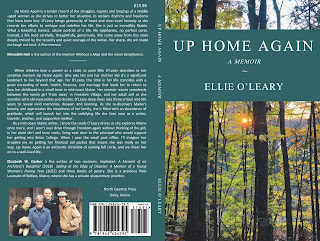Terza Rima
Today we go back to a rhyming form, the terza rima. The best known and probably oldest recorded use of this form is in Dante’s The Divine Comedy. Like many forms, it seems so simple - tercets (three line stanzas) with a repetitive, interlocking rhyme scheme. In the first stanza, lines one and three rhyme. In the second stanza, the first and third lines rhyme with line two in the first stanza. It looks like this aba, bcb, cdc, and so on for a lot of stanzas, but make note: this form came out in the Italian language, in which rhyming is easier. There are simply more rhyming words. In English, we can get bogged down. A question for translators of The Divine Comedy is whether or not the stanzas should rhyme in English or stay closer to the meaning in Italian. It’s been done both ways.
To bring this rhyming gallop to an end, poets use a variety
of options from ending with no more stanzas, employing a rhyming couplet instead
of a tercet with no middle line for an additional rhyme, or using a final couplet
that loops back to use the initial a rhyme from the first stanza. Dante
chose to end each section of the The Divine Comedy with a
single line completing the rhyme scheme with the end-word of the second line of
the preceding tercet.
While English poets Geoffrey Chaucer and Thomas Wyatt
popularized the form in the English language, some more recent examples are
below. In English poets often use slant or near rhyme.
Sow Sylvia
Plath
God knows how our neighbor managed to breed
His great sow:
Whatever his shrewd secret, he kept it hid
In the same way
He kept the sow--impounded from public stare,
Prize ribbon and pig show.
But one dusk our questions commended us to a tour
Through his lantern-lit
Maze of barns to the lintel of the sunk sty door
To gape at it:
This was no rose-and-larkspurred china suckling
With a penny slot
For thrift children, nor dolt pig ripe for heckling,
About to be
Glorified for prime flesh and golden crackling
In a parsley halo;
Nor even one of the common barnyard sows,
Mire-smirched, blowzy,
Maunching thistle and knotweed on her snout-cruise--
Bloat tun of milk
On the move, hedged by a litter of feat-foot ninnies
Shrilling her hulk
To halt for a swig at the pink teats. No. This vast
Brobdingnag bulk
Of a sow lounged belly-bedded on that black compost,
Fat-rutted eyes
Dream-filmed. What a vision of ancient hoghood must
Thus wholly engross
The great grandam!--our marvel blazoned a knight,
Helmed, in cuirass,
Unhorsed and shredded in the grove of combat
By a grisly-bristled
Boar, fabulous enough to straddle that sow's heat.
But our farmer whistled,
Then, with a jocular fist thwacked the barrel nape,
And the green-copse-castled
Pig hove, letting legend like dried mud drop,
Slowly, grunt
On grunt, up in the flickering light to shape
A monument
Prodigious in gluttonies as that hog whose want
Made lean Lent
Of kitchen slops and, stomaching no constraint,
Proceeded to swill
The seven troughed seas and every earthquaking continent.
Acquainted with the Night Robert Frost
I have been one
acquainted with the night.
I have walked
out in rain—and back in rain.
I have
outwalked the furthest city light.
I have looked
down the saddest city lane.
I have passed
by the watchman on his beat
And dropped my
eyes, unwilling to explain.
I have stood
still and stopped the sound of feet
When far away
an interrupted cry
Came over
houses from another street,
But not to call
me back or say good-bye;
And further
still at an unearthly height
One luminary
clock against the sky
Proclaimed the
time was neither wrong nor right.
I have been one
acquainted with the night.

Comments
Post a Comment